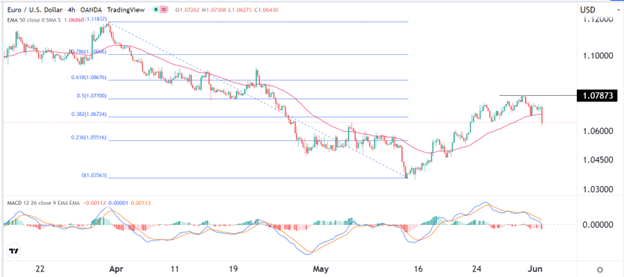Bearish View
- Sell the EUR/USD and set a take-profit at 1.0550.
- Add a stop-loss at 1.0725.
- Timeline: 1-2 days.
Bullish View
- Set a buy-stop at 1.0680 and a take-profit at 1.0790.
- Add a stop-loss at 1.0600.
The EUR/USD pair retreated after the Federal Reserve prepares to start its quantitative tightening policy. It also declined as investors wait for the upcoming jobs numbers from the United States. It is trading at 1.0643, which is slightly below this week’s high of 1.0786.
Fed Prepares for QT
The EUR/USD made a strong pullback on Wednesday after the Fed made plans to start shrinking its $8.9 trillion balance sheet. The bank is expected to reduce its assets at a pace that is twice as fast as the last financial crisis. The current size of quantitative tightening is about $47.5 billion per month. It will then double to $95 billion in September.
The Fed hopes that a combination of balance sheet reduction and high-interest rates will slow the economy and inflation without causing a recession. It has hinted that it will hike interest rates by 0.50% in the next three meetings and then shift to 0.25%.
However, some analysts believe that the Fed could pause rate hikes in September as it reflects on the impact. Notably, many investors believe that inflation growth may have peaked in April.
The next key catalyst for the EUR/USD pair will be the upcoming US jobs numbers. On Wednesday, data by the Bureau of Labor Statistics showed that the number of job openings slowed in April. The country had about 11.4 million openings, down from the previous 11.85 million.
On Thursday, ADP will publish its estimates for private payroll data. Economists expect the data to show that the private sector added 300k jobs in May from the previous 247k. The BLS will also publish the closely watched initial jobless claims.
And on Friday, the BLS will release the non-farm payroll data. The expectation is that the unemployment rate declined in May while wage growth continued.
EUR/USD Forecast
The four-hour chart shows that the EUR/USD pair declined to a low of 1.0627 in the overnight session. This was the lowest it has been since May 23rd. Also, the price was slightly below the 38.2% Fibonacci retracement level. At the same time, it has moved below the 50-period moving average while the MACD has crossed the neutral point.
Therefore, it seems like the recent rally may have peaked. As such, the pair will likely keep falling as bears target the key support at 1.055.

